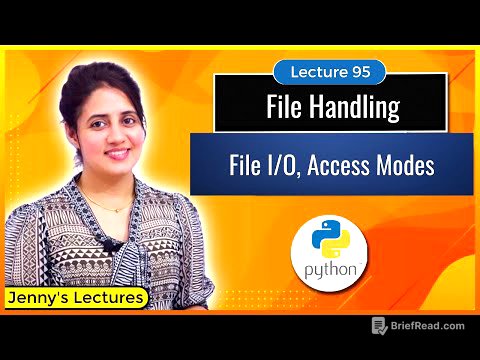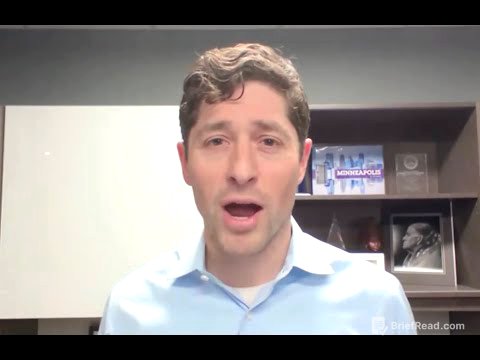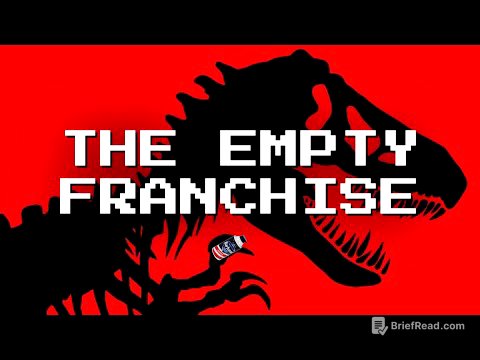TLDR;
This video addresses students wondering if they can still prepare for the JEE exam if they haven't studied much yet. It emphasizes the importance of realistic self-assessment, the limited time available, and the potential for wasted effort if preparation is started too late. The video also cautions against being misled by overly optimistic educators and encourages students to consider alternative career paths if necessary.
- Realistic assessment of preparation level is crucial.
- Time is limited, making comprehensive preparation difficult.
- Overly optimistic educators may not provide realistic guidance.
- Alternative career paths should be considered if JEE preparation is not feasible.
Can You Still Crack JEE? [0:00]
The speaker directly addresses the question of whether it's still possible to prepare for the JEE exam effectively. If you haven't studied anything yet, the answer is no. If you've covered 30-40% of the material, then there's a possibility. The speaker emphasizes that if you've been deceitful with your studies, even with available facilities, success is unlikely.
Realistic Expectations and Preparation Levels [1:01]
For students with some preparation (30-40%), pushing harder might lead to average performance in the January attempt and better results in April, potentially clearing JEE Advanced. However, if you haven't covered even 10-20% of the syllabus, targeting the April attempt will be challenging. The speaker cautions against believing success stories of students achieving remarkable results in short periods, as these are exceptions and luck plays a significant role.
Honest Self-Assessment and Avoiding False Hope [1:49]
If you haven't started preparing seriously and have been neglecting your studies despite having all the facilities, it's unlikely you'll be able to handle the intense pressure of studying 14-15 hours daily for the next 7-8 months. The speaker suggests either taking a drop year seriously or considering a different career path aligned with your interests. He criticizes educators who offer false hope to attract students to coaching centers, driven by pressure to avoid demoralizing students.
Time Constraints and Syllabus Coverage [3:33]
With October already underway, there are roughly two months left before the JEE Mains exam. The speaker outlines the extensive syllabus, comprising approximately 28 chapters in Physics alone (15 from 11th grade and 12-13 from 12th grade), plus additional chapters in Maths and English, Physical Education, or Computer Science for the board exams. This totals around 70-80 chapters to cover in just three months, making it unrealistic to complete the entire syllabus.
Avoiding Misleading Strategies and Understanding JEE Pattern [4:31]
The speaker warns against relying on selective study of "important" chapters, as the JEE Mains pattern can be unpredictable. Unexpected changes can jeopardize your chances in both JEE Mains 1 and 2, as well as JEE Advanced. He advises against being misled by those who claim success is still possible, emphasizing that consistent hard work is essential.
Reality Check and Alternative Career Options [4:55]
The speaker questions what can be achieved in just two to three months if consistent effort hasn't been put in previously. He suggests that if you haven't started studying yet, you should continue if you've started now. If you're still being deceitful, engineering or NEET might not be the right path, and exploring other areas of interest is recommended. For those who have prepared to some extent, consistent study is encouraged, targeting both January and April attempts.
Innocence of Students and Experience of Educators [5:46]
The speaker cautions against blindly trusting educators solely based on their years of experience, as they may be influenced by external pressures. He explains that educators might offer false hope to avoid losing a large number of students, which could negatively impact their reputation. The speaker notes that educators who provide realistic assessments might be less popular than those who offer false promises.
Core Subject Educators and Crash Courses [7:27]
The speaker encourages viewers to value core subject educators who provide genuine education, even if they have fewer subscribers. He advises caution when someone claims that success is still possible, urging viewers to check if they are affiliated with any coaching institute. The speaker emphasizes that things are not easy and that the JEE paper is not like a CBSE paper.
Two-Year Preparation and Crash Course Considerations [8:20]
The speaker questions why students prepare for two years if success could be achieved in just three to four months. He criticizes the false hope and assurances given to students to join crash courses, even though the chances of success are slim. The speaker advises that if you want to do any crash course, then you should be clear about this, friend, do not get stuck in the middle, just keep it clear that either it is a no or it is a yes, if it is a yes, then start preparing, it is a no. If you feel you've given up, consider changing your career option.




![The Digimon Multiverse & Timeline(s) - An 11 HOURS IN-DEPTH ANALYSIS [Digimon Conversation #104]](https://wm-img.halpindev.com/p-briefread_c-10_b-10/urlb/aHR0cDovL2ltZy55b3V0dWJlLmNvbS92aS9FbWtaQXlxc3R3US9ocWRlZmF1bHQuanBn.jpg)




